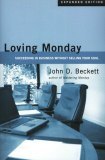Commit Your Work to the Lord: Work and Financial Independence: Sermon on 1 Thessalonians 4
Sermon Notes / Produced by The High Calling
Text: 1 Thessalonians 4:9-12: Now concerning brotherly love you have no need for anyone to write to you, for you yourselves have been taught by God to love one another, 10 for that indeed is what you are doing to all the brothers throughout Macedonia. But we urge you, brothers, to do this more and more, 11 and to aspire to live quietly, and to mind your own affairs, and to work with your hands, as we instructed you, 12 so that you may walk properly before outsiders and be dependent on no one.
The Main Idea: The high calling of our work requires that we work in order to keep from burdening the church, which is a loving thing to do and the means by which we can be a blessing to the church.
Introduction: The preacher may want to start by describing a personal story about a time when he or she was in need, maybe struggling through seminary or having lost a job, and dependent on others to survive. We have all been there, or know someone who was/is. And we are to care for people in the church who are in need. But neediness is not a spiritual virtue. It’s less than what God wants for us. God wants us able to care for ourselves, and as he blesses us to then also care for others. Hard-working people, successful workers who bring home a paycheck and care for their own needs, not only care for themselves but keep from being a burden on the church. While we may be in a place of need from time to time, we are to aspire to a life of financial independence.
During the introduction (or possibly elsewhere in the sermon where the preacher sees fit,) it might be helpful to add a disclaimer that this passage is not promoting a robust Americanism, though there are some similarities.
Context
I. Independent Workers Are Loving the Church (1 Thessalonians 4:9-10, 12) Exposition: The Thessalonian church was growing in their love for one another, as God was at work among them. A loving church can’t share with those in need unless some of them aren’t in need. So in order to love more and more (10b), they must pursue a life where hard work made them dependent on no one (12). Financial independence gives us more opportunity to love.
Church Context: The preacher, knowing the culture of the surrounding community, could add a word here on that context. Suburban materialism. Urban elitism. Climbing the corporate ladder. White or blue collar. All of these have their particular views of financial independence, especially in America. The need of the day is to get beyond a selfish type of American individualism and toward a generous type, where the fruit of our work is for the sake of others.
II. Independent Workers Stay Focused on the Job (1 Thessalonians 4:10b-11a)
Exposition: Focus was a problem at the time for some in the church in Thessalonica. The second coming of Jesus was so near that their daily work took a secondary importance. Some were dropping their jobs and settling in for the glory to come.
Paul mentions three aspects of the kind of work he encourages:
A. Live quietly – creating a stir can hurt your work, and distract you with thoughts about coworkers and work issues rather than work itself. God called you to your work, not theirs.
B. Mind your own affairs – to be content in purpose, not complaining, with a singular focus on what you are doing.
C. Work with your hands – realize no work is below you. God has the “hands” of a hard worker in creation, incarnation, resurrection, and consummation. All require his work and getting his “hands dirty.”
Key Point: The best workers are often the ones who make the least noise, who mind their own business and let their productivity do the talking.
III. Independent Workers Are Good Witnesses (1 Thessalonians 4:11b-12)
Illustration: The preacher may want to point out current news stories about people who have failed in the workplace, like scandals by greedy executives. (Aren’t they consistently in the paper?) Make the point that we know how much the workplace can define our life and integrity and sense of responsibility. Our workplace is a place where we connect most regularly and transparently with a lost and dying world. And how we work will speak volumes about the kind of people we are. Are we witnesses to a King who has given us his new way to be human in the workplace, with new motivations and goals? Or are we tied up in the same pursuits as the world?
Exposition: Paul says our quiet and focused work helps us “walk properly before outsiders.” It is a part of our witness. Good workers point to the One who motivates us and shows us the purpose of our work.
Conclusion: The strongest, most loving churches are caring churches. Love for one another is obvious and sacrifice for those in need is often necessary. But that can’t happen unless the church is characterized by people who stay focused on doing their work diligently and taking care of their family and responsibilities. While financial independence often leads Americans to building our own “kingdoms,” in Christ they can be used for building his.
Illustration: John Wesley was not only at the source of what we call Methodism, he was a sacrificial, faithful Christian who is a great example of living for the blessing of the church. When his income was 30 pounds a year, he limited himself to using 28 so he could give 2 to the poor. Even as he earned more money in the years to come, he continued to live off of the same amount. Within four years, he was earning 120 pounds but by living off of 28. He had 92 pounds to give away. Later in his life, he earned 1400 pounds and lived off of 30. Wesley had no family to care for so he could live very simply. We probably can’t live up to this level of generosity. But we can certainly aim more in Wesley’s direction for the sake of the poor, the church, and the mission of God in the world.
******************************************************************************
These sermons were written by Steve McCoy. Steve is the Pastor of Calvary Baptist Church in Woodstock,
Illinois, a distant suburb of Chicago. He earned an MDiv from The Southern Baptist Theological Seminary.
He is married to Molly, and they have four children. Steve’s blog, Reformissionary, can be found at
www.stevekmccoy.com.
Click here for a PDF of this sermon.
Other sermons in the series Commit Your Work to the Lord:







